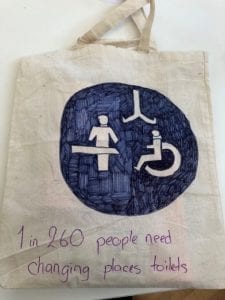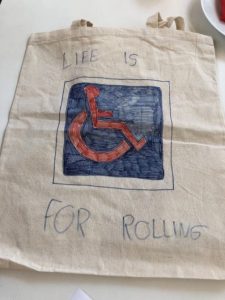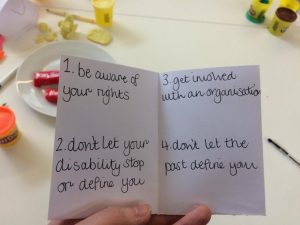Glasgow Disability Alliance
Case study
About GDA
Founded on human rights and a belief that those who experience inequality should be involved in solutions to tackle it, Glasgow Disability Alliance (GDA) was set up to provide disabled people in Glasgow with accessible opportunities to build confidence, connect with peers and wider services and support them to contribute to their families, communities, workplaces, and wider society. Since its fledgling vision of strengthening voices and tackling social isolation in 2000, GDA has grown from strength to strength and is now a vibrant, multi award winning disabled people led organisation with over 5000 members plus groups led by disabled people: GDA is the biggest groundswell of disabled people and “community of interest” in Europe.
GDA programmes
Through accessible learning, coaching, events and activities GDA connects over 1000 disabled people with each other, with services, with opportunities and with decision makers every year. We recognise talents and strengths and support disabled people to build on these, to participate and to be leaders in their own lives. GDA supports disabled people of all ages and any type of impairment or condition through our powerful 5000 strong community and our accessible programmes of confidence building and wellbeing, consciousness raising and collective voice to influence services and decisions which affect us.
Intersecting Identities and Barriers
GDA recognises that disability is only one part of a disabled person’s identity and takes an holistic approach based on understanding that we are all more than one thing: disabled people are also women and men, LGBT, BAME, older and younger people and can have faith or no faith. Disabled people are amongst the worst hit by austerity and make up almost half of those in poverty. They are more likely to be unemployed, in insecure employment, or economically inactive, as well as being less likely to have formal qualifications. Disabled people experience health inequalities and poorer life outcomes all round and this is compounded by loneliness and isolation affecting disabled people of all ages. Barriers such as lack of accessible transport and the built environment, lack of access to services, lack of opportunities to learn, work or volunteer, lack of access to rights and justice and overwhelming interrelated barriers to participation: these combined prevent disabled people from fulfilling their potential.
The barriers and issues which disadvantage both disabled people and women are compounded for disabled women and the impact is exponential: a multiplier effect of discrimination and exclusion. These include voicelessness, invisibility and lack of representation across society e.g. as parents, in families and communities, within the media, in workplaces and in leadership roles e.g. in politics. Disabled women are at increased likelihood of violence and abuse, face lower expectations through school and adulthood of what we can achieve and die younger than the general population.
As a response to barriers, GDA delivers specific peer support and peer led programmes with intersectional groups of disabled people including disabled women and girls with all our diverse talents, identities and contributions. These build confidence and voices to participate, to be visible to and link with wider connections and opportunities so that we can contribute our talents and be part of solutions to the problems we face.
Disabled Women and Girls
For 14 years, enabled by funding for accessible Programmes which support participation via transport, personal assistance, accessible information and other access adjustments, we have supported discrete groups of disabled women and young women through courses such as confidence building and using your voice, personal safety, violence against women, sexual health and identity, health and wellbeing and bereavement, loss and isolation. We have also used personal coaching to raise aspirations of disabled girls and women who often have exceptionally low expectations of their potential due to barriers and the impact on crushing identity, confidence and self worth.
GDA Zine- Making Project
Recently, GDA worked with Amanda Ptolomey (@amandasays), a PHD student who is undertaking research with disabled and neurodiverse young women and girls using visual methods. GDA brought together a group of 12 young women and girls from our membership to do a three-day zine making course to explore identities, barriers and what is needed in a supportive environment with peers, access and an empathetic and supportive facilitator. As a result- the course was a great success!
The young women and girls thoroughly enjoyed the experience and created some impactful zines that explored their identities, experiences of growing up and their experiences of being disabled young women and girls with all the barriers and limitations imposed on them. They also built and developed relationships with each another.


“Meeting others in the same boat and hearing their stories gives me confidence- I can try things and with the right support I can achieve what I want. We need organisations like GDA to support us and believe in us because they are disabled people themselves.” young women, GDA member
“I loved doing it, I loved it. Beforehand, when I first seen the zine making thing in the newsletter I thought -this won’t be for me. But it was. It worked out really well. The access was all there- transport and help to take part- I’m really glad I did it… I hope I get to do stuff like this in the future.” young women, GDA member
“I really enjoyed it as well coz I also met other women from that group that I’d never met before, and became friends.” young women, GDA member
A sense of collective and mutual support between these young women grew over the 3 days as did their courage and resilience. The accessible peer learning and consciousness raising enabled them to have fun, build skills and meet others in the same boat. They also began to explore and examine their inequality and oppression, understanding their rights, taking control of their situation and planning for change- at small levels individually and collectively. Follow-up work included a series of interviews with the young women and girls who took part in Amanda’s research. There are also plans for a sharing event later this year where those members who took part can showcase what they made and their lessons and learning over the three days.
Empowerment for young disabled women
At a second event inspired by feminist activism, young disabled women alongside young disabled men produced a zine about empowerment for young disabled people outlining the powerful advice that young disabled people need to be aware of their rights to overcome barriers associated with disability and that the role of DPOs (disabled people led organisations) is vital in informing them of these rights, providing accessible supports and encouraging them to “dare to dream” for their futures.
Also at this event, young disabled people developed a series of activist tote bags, inspired by the Glasgow Women’s Library tote bag.

If you would like to join GDA, please call 0141 556 7103.
W: www.gda.scot
T: @GDA__online